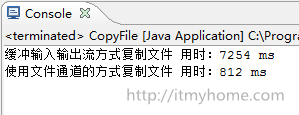Java复制文件 下面介绍两种方法
一种是使用传统的缓冲输入输出流(InputStream、OutputStream)来实现
另外一种使用文件通道(FileChannel)来实现,效率上FileChannel会比InputStream快
而且文件越大对比越明显
一、缓冲输入输出流(InputStream、OutputStream)
/**
* 缓冲输入输出流方式复制文件
* @param srcFileName 待复制的文件名
* @param descFileName 目标文件名
* @param overlay 如果目标文件存在,是否覆盖
* @return 如果复制成功返回true,否则返回false
*/
public static boolean copyFile(String srcFileName, String destFileName,boolean overlay) {
File srcFile = new File(srcFileName);
// 判断源文件是否存在
if (!srcFile.exists()) {
try {
throw new Exception("源文件:" + srcFileName + "不存在!");
} catch (Exception e) {
e.printStackTrace();
}
return false;
} else if (!srcFile.isFile()) {
try {
throw new Exception("复制文件失败,源文件:" + srcFileName + "不是一个文件!");
} catch (Exception e) {
e.printStackTrace();
}
return false;
}
// 判断目标文件是否存在
File destFile = new File(destFileName);
if (destFile.exists()) {
// 如果目标文件存在并允许覆盖
if (overlay) {
// 删除已经存在的目标文件
new File(destFileName).delete();
}
} else {
// 如果目标文件所在目录不存在,则创建目录
if (!destFile.getParentFile().exists()) {
// 目标文件所在目录不存在
if (!destFile.getParentFile().mkdirs()) {
// 复制文件失败:创建目标文件所在目录失败
return false;
}
}
}
// 复制文件
int byteread = 0; // 读取的字节数
InputStream in = null;
OutputStream out = null;
try {
in = new FileInputStream(srcFile);
out = new FileOutputStream(destFile);
byte[] buffer = new byte[1024];
while ((byteread = in.read(buffer)) != -1) {
out.write(buffer, 0, byteread);
}
return true;
} catch (FileNotFoundException e) {
return false;
} catch (IOException e) {
return false;
} finally {
try {
if (out != null)
out.close();
if (in != null)
in.close();
} catch (IOException e) {
e.printStackTrace();
}
}
}二、文件通道(FileChannel)
/**
* 使用文件通道的方式复制文件
* @param srcDirName 待复制的文件名
* @param destDirName 目标文件名
*/
public static void fileChannelCopy(String srcDirName, String destDirName) {
FileInputStream fi = null;
FileOutputStream fo = null;
FileChannel in = null;
FileChannel out = null;
try {
fi = new FileInputStream(new File(srcDirName));
fo = new FileOutputStream(new File(destDirName));
in = fi.getChannel(); // 得到对应的文件通道
out = fo.getChannel(); // 得到对应的文件通道
in.transferTo(0, in.size(), out); // 连接两个通道,并且从in通道读取,然后写入out通道
} catch (IOException e) {
e.printStackTrace();
} finally {
try {
fi.close();
in.close();
fo.close();
out.close();
} catch (IOException e) {
e.printStackTrace();
}
}
}测试代码
public static void main(String[] args) {
String srcDirName = "D:/jdk-6u2-windows-i586-p.exe";
String destDirName = "D:/jdk-6u2-windows-i586-p-bak.exe";
long start;
long end;
start = System.currentTimeMillis();
CopyFile.copyFile(srcDirName, destDirName, true);
end = System.currentTimeMillis();
System.out.println("缓冲输入输出流方式复制文件 用时:" + (end - start) + " ms");
start = System.currentTimeMillis();
CopyFile.fileChannelCopy(srcDirName, destDirName);
end = System.currentTimeMillis();
System.out.println("使用文件通道的方式复制文件 用时:" + (end - start) + " ms");
}输出结果
所测试文件大小为65M,由此可见FileChannel复制文件的速度比FileInputStream快很多。
而且FileChannel是多并发线程安全的。
作者:itmyhome
